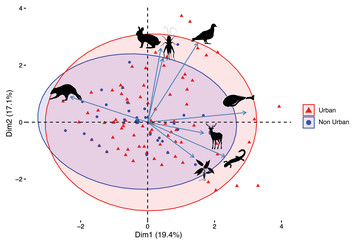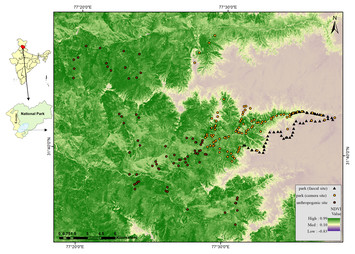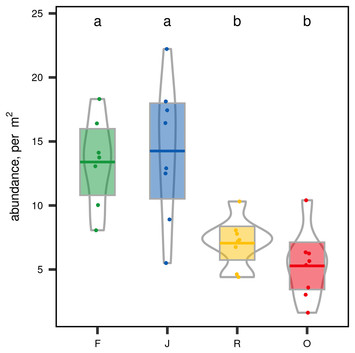PeerJ Section
Ecology
Welcome to your community’s home at PeerJ. Sections are community led and exemplify a research community’s shared values, norms and interests.
The citation average is 6.1 (view impact metrics).
36,375 Followers
Section Highlights
View all Ecology articles 

21 September 2022
DNA metabarcoding reveals that coyotes in New York City consume wide variety of native prey species and human food
"This interesting study used non-invasive scat sampling and DNA metabarcoding to profile vertebrate, invertebrate, and plant dietary items with the goal to compare the diets of urban coyotes to those inhabiting non-urban areas."
 Xavier Pochon, Handling Editor
Xavier Pochon, Handling Editor
 Xavier Pochon, Handling Editor
Xavier Pochon, Handling Editor

16 September 2022
Understanding the distribution and fine-scale habitat selection of mesocarnivores along a habitat quality gradient in western Himalaya
"There is scarce information of the impacts of anthropogenic changes in the vulnerable Himalayan ecosystem on carnivore communities."
 Fernanda Michalski, Handling Editor
Fernanda Michalski, Handling Editor
 Fernanda Michalski, Handling Editor
Fernanda Michalski, Handling Editor

16 August 2022
Rainforest conversion to rubber and oil palm reduces abundance, biomass and diversity of canopy spiders
"Arthropod decline is becoming a substantial, and potentially existential, issue worldwide. Papers like this that both set baselines and provide analyses are more vital than ever."
 Dezene Huber, Handling Editor
Dezene Huber, Handling Editor
 Dezene Huber, Handling Editor
Dezene Huber, Handling Editor

10 August 2022
Evaluation of colonization and mutualistic endophytic symbiosis of Escherichia coli with tomato and Bermuda grass seedlings
"Verma and colleagues demonstrate that Escherichia coli can establish as an endophyte in at least two types of plants and become a plant-symbiont by stimulating the host development."
 Joseph Gillespie, Handling Editor
Joseph Gillespie, Handling Editor
 Joseph Gillespie, Handling Editor
Joseph Gillespie, Handling Editor

3 August 2022
Assisted migration and the rare endemic plant species: the case of two endangered Mexican spruces
"Assisted migration continues to grow as an important discussion in plant (particularly tree) conservation. This paper presents an interesting scenario where the only suitable locations to "migrate" a species to are well outside of the usual range (rather than quite near to or adjacent to the usual range) – transcontinental shifts. That hypothetical situation, of course, brings up a whole host of other issues, and it means that climate adaptation in terms of conservation of certain species will either be impossible, or inadvisable, or extremely difficult (in terms of both practical issues and policy) and costly."
 Dezene Huber, Handling Editor
Dezene Huber, Handling Editor
 Dezene Huber, Handling Editor
Dezene Huber, Handling Editor

25 July 2022
Forest tree species distribution for Europe 2000–2020: mapping potential and realized distributions using spatiotemporal machine learning
"The paper provides a geospatial product that will certainly be useful for conservation planning"
 Diogo Provete, Handling Editor
Diogo Provete, Handling Editor
 Diogo Provete, Handling Editor
Diogo Provete, Handling Editor

4 July 2022
What makes a house a home? Nest box use by West European hedgehogs (Erinaceus europaeus) is influenced by nest box placement, resource provisioning and site-based factors
"The reviewers considered this a well-conducted study that used a citizen survey to identify important variables for future research on the role of nest boxes to increase populations of a species of conservation concern. Although focused on the western European hedgehog, with implications for studying the role of artificial shelters for other species and habitats."
 Donald Kramer, Handling Editor
Donald Kramer, Handling Editor
 Donald Kramer, Handling Editor
Donald Kramer, Handling Editor

9 June 2022
Use of semantic segmentation for mapping Sargassum on beaches
"The article proposes an interesting application of deep learning techniques to citizen-collected images of coastal areas, allowing to estimate Sargassum coverage on the beaches. This represents an important contribution to the management of this environmental problem."
 Matteo Zucchetta, Handling Editor
Matteo Zucchetta, Handling Editor
 Matteo Zucchetta, Handling Editor
Matteo Zucchetta, Handling Editor

31 May 2022
Dramatic impact of future climate change on the genetic diversity and distribution of ecologically relevant Western Mediterranean Carex (Cyperaceae)
"Vital new conservation data on two related plants - one common, one much less so - in one of earth’s biodiversity hotspot regions in the context of accelerating climate change."
 Dezene Huber, Handling Editor
Dezene Huber, Handling Editor
 Dezene Huber, Handling Editor
Dezene Huber, Handling Editor

27 May 2022
Animal reactivity to camera traps and its effects on abundance estimate using distance sampling in the Taï National Park, Côte d’Ivoire
"Large scale assessment of abundance with consideration on biases."
 Patrick Bergeron, Handling Editor
Patrick Bergeron, Handling Editor
 Patrick Bergeron, Handling Editor
Patrick Bergeron, Handling Editor
Collections
View all 
The State of Active Coral Reef Conservation and Restoration

5th World Conference on Marine Biodiversity

Coronaviruses and Viral Respiratory Infections

Proceedings of VIHAR 2019: the 2nd International Workshop on Vocal Interactivity in-and-between Humans, Animals and Robots

Third International Workshop on the Toarcian Oceanic Anoxic Event – Impact on marine organisms and ecosystems

36,375 Followers
Discussion
Coyotes Came to New York City, but Not For Our Pizza
https://www.nytimes.com/2022/10/03/science/coyotes-new-york-diets.html

